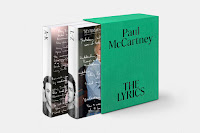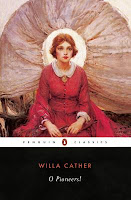The ten best--most enjoyable, most thought-provoking, most edifying, most question-raising, most fun--books I read this past year, in alphabetical order by title.

The Arc of a Scythe--Scythe, Thunderhead, and The Toll--has been a young-adult sci-fi obsession for my wife and three of our four daughters for several years now; this Christmas break, I decided to dive in, and I'm glad I did. The genre Shusterman writes in has some inherit limitations, but this series--a three-part story of a futuristic, utopian world where disease and death have been conquered, where all needs are satisfied that an incorruptible, all-powerful AI, and where for over two centuries the population has been controlled by an, ultimately, highly corruptible and power-seeking group of "scythes"--transcended those limitations in many ways. It was a quick read, relatively speaking, but Shusterman consistently surprised me with his characterizations and plotting, working through his outlandish scenarios with insight, creative foreshadowing, and writing persuasive enough that the holes (and when you're dealing with something as crazy as essentially Logan's Run as a Lord of the Rings-length--at least insofar as page numbers are concerned--epic, there were more than a few!) mostly had me asking questions--just what kind of religions would emerge in an age where death and crime no longer existed? just how would a perfect AI committed to its original programming respond to humans attempting to subvert it?--rather than complaining. As a Christmas vacation read, this was a great, fun choice.

Jesimin's The City We Became is a genius work, the best literally "urban fantasy" I have ever read. Imagining that cities themselves, once they reach a certain size and age, become conscious in the form of avatars which are selected from their population in some mystical, representative way, is terrifically cool; imagining further that gentrification, corporate chains, suburbanization, and other threats to the organic, heterogeneous, diverse, and decentralized nature of cities (or, at least, to the nature of one particular vision of urbanism) takes the form of some kind of racially obsessed Lovecraftian monster is coolness doubled. I had some frustrations with the political strawmanning Jesimin engaged in throughout the book--sometimes it was more polemic than fantasy--but those frustrations didn't come close to making me love it any less. I can't wait to dive into the sequel this year.

A classic that I only got around to reading this year, Koestler's Darkness at Noon is a haunting short novel. Built around a barely disguised portrait of an early 20th-century communist revolutionary betrayed and ultimately executed by the Community Party of the USSR, the heart of the book is its exploration of how the psychological effects of the totalitarian politics pursued by the Soviet Union played out in the minds of partisans, intellectuals, dissidents, and those who just wanted to survive. The interrogations of Rubashov, and the way they opened up recollections and conversations between him and is primary interlocutor, Ivanov, allowed some great, powerful philosophical observations. Rubashov's fate is obvious an influence on George Orwell's Winston Smith; it made me want to re-read 1984, which years ago had an immense impact of me.

One reading project I fell into this year was reading Willa Cather; of the three novels of hers I read, Death Comes for the Archbishop stands out as perhaps the one in which Cather's command of the English language struck me most deeply. The steady, controlled pace of this story of the long life and slow, but also steady, successes (as well as failures) experienced by Catholic missionaries in 19th-century New Mexico can't help but be experienced by a thoughtful reader, I think; Cather ties the passage of time and an almost tangible sense of the colors, smells, and temperatures of the physical environment to how she tells her story, in a way I have rarely encountered before (but which is common to all of the Cather novels I read). I've never been a fan of the desert, but Death made me, once again, recognize and even kind of feel the stark holiness and deep sensitivity that arid, slowly evolving environments can provide.

An Inconvenient Apocalypse is not a book I entirely agreed with; while I am certainly not climate scientist, and don't have any deep familiarity in the environmental data which grounds the dark predictions of Jackson and Jensen, the fact remains that my own take on how human history operates prevents me from seeing the apocalyptic end of industrial civilization which they present as inevitable as occurring in a time frame which would result in all the calamities they foresee. (Basically: it would make a massive difference if the reduction of the human population by half occurred over a millennia, as opposed to a century.) All that being said, I had nothing but admiration for the book, because the stark language they used, confronting directly what kind of hope they think is possible in the face of climate catastrophe was marvelously bracing. I wrote more on this wonderful little book here.

My obsession with Sir Paul McCartney has been demonstrated repeatedly on this blog over the past three years or so; hence, it was probably inevitable that I would love The Lyrics, which is probably the closest we'll ever come to an autobiography from the man. It's widely known that Macca, arguably the single most-interviewed human being on the planet, regularly regurgitates the same lines in response to the same questions, over and over again; by getting him to thinking about the words of his songs, this collaborative work brings out insights and memories from McCartney that we might never had read otherwise. A genuine treasure-trove of Beatles trivia, musical insight, historical reflection, and just plain Sir Paul charm.

This was my favorite of the three Cather novels I read, just because the characters presented in My Ántonia were so admirable, curious, engaging, tragic, and real, and none more so than the marvelous creation of Ántonia Shimerda herself. Her resourcefulness, determination, and abounding fertility (metaphorical and literal!) never made her seem like some kind of simplistic folk creation; every one of those virtues came with great costs. And that's really Cather's greatest accomplishment in this novel: showing us a slice of American history wherein the forces of America's prairies and the human heart brought forth, through the choices her characters make, immense sacrifices, terrible mistakes, genuine triumphs, all of which those characters carried forward through their dialogue and plot arcs, leaving us--or me, at least--just wanting more.

A third classic, but actually my least favorite of the three Cather novels I read this year. Of the three, O Pioneers! has the most predictable and melodramatic plot, but that doesn't get in the way of the amazing way Cather captures the look, feel, and smell, the beauty and ugliness, the color and the grayness, of the American prairies. Nebraska may not exactly be Kansas, and the 2020s certainly aren't the 1890s, yet I found in her physical descriptions of the land and the people who live upon it an immense amount of truth. A lovely book, even though she wrote even better ones later.

Paradise Now is a wonderful history of 19th-century utopian movements, including both the communities they built, the individuals and ideas which motivated them, and the internal contradictions which led, in almost every case, to their eventual dissolution. By so doing, Jennings is able to use these movements to explore rich ideas pertaining to capitalism and socialism, to democratic individualism and familial communalism as they were articulated and responded to during the transformations of the Industrial Revolution. I wish the author could have extended his sympathetic look at the utopian impulse into continuing efforts to live out, or at least explore, dissent from both globalized capitalism and the centralized state today, but I suppose he'd already done enough by the time he brought this long history to a close; I attempted to extend upon his thoughts here.

Yep, a celebrity memoir; but honestly, Surrender is pretty wonderful. It's a book filled with funny, insightful, often simplistic but nonetheless sometimes also challenging observations and ideas about music, Ireland, charity, international development, America, the record business, personal trauma, family history, global geopolitics, and being an arrogant ass (as Bono freely and regularly admits he often was throughout his long career, and still often is). I wrote some reflections on the elements of the book pertaining to Bono's activism here, but honestly, just read it for Bono's lyricism as he writes about his bandmates, his friends, his enemies, and most of all his wife and family--the man is a fine writer, that can't be denied.
No comments:
Post a Comment